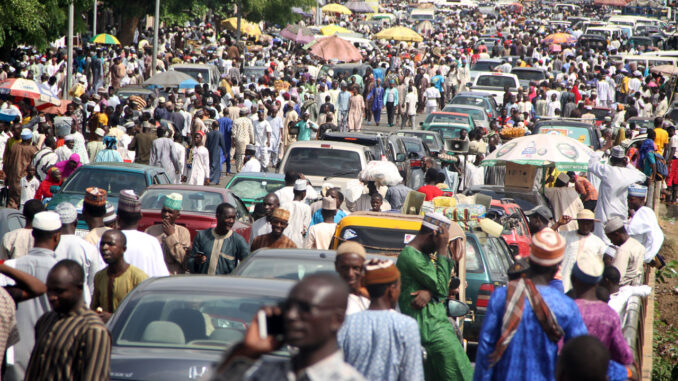
IN the past few weeks, the living conditions of Nigerians have been steadily worsening. Things have been so bad, even as the ravaging effects of the coronavirus pandemic take their toll. The economy has nosedived abysmally, increasing the miseries of ordinary Nigerians. The prices of consumables have literally gone through the roof and hunger daily stalks the people. Actually, things have been terrible throughout this year, but the past three months have been particularly harrowing for the majority of Nigerians who live from hand to mouth.
In May, according to reports, food prices increased astronomically. Among other staples, the prices of maize, gari, palm oil, vegetable oil and beans shot to the roof. In particular, the price of white gari grew by over 50 per cent compared to last year, while the price of yellow maize grain added up to 51 per cent more. Things have grown progressively worse since then. The local variety of rice, ofada, currently costs as much as N2,200 per congo, while a piece of Titus fish of average size costs about N1,200. With a congo of gari selling for between N600 and N800 depending on the variety, it is clear that life has become a nightmare for millions of Nigerians who can hardly afford to cook a decent meal. It is a fact that between last year and this year, no food item has recorded a decrease in price, and reports suggesting that Nigeria is among the countries with the highest inflation rate in the world and recorded a fast growing consumer price index are simply spot on.
The ugly development in the country started a long time ago, but it has been definitely worsened by the lackadaisical and desultory attitude of the current administration which, rather than pursue welfarist policies, has exposed the economy to the vagaries of the free market with Darwinian implications, and without institutional interventions. As a matter of fact, the government even increased the prices of its own services: obtaining things like vehicle number plate and driver’s licence now comes at a huge cost. The administration reduced the interest rate on savings accounts and increased value added tax. It has just unveiled its plans to toll the country’s bad roads just because it wants to increase its revenue base.
Food has become really scarce and expensive because its production has been hampered. Farmers have been scared off their farms, with Fulani herdsmen raiding farmlands, raping, maiming and killing farmers at will. In some places with less grim experiences, bandits tax farmers heavily before they are allowed to till their own land, and before they are allowed to harvest their crops. Scared off their farms, farmers have become objects of pity in their own fatherland. Food production dipped, making the prices of food items exorbitant in epic proportions. The unemployment figures released by the National Bureau of Statistics (NBS) are frightening, and these figures are even conservative. The exact figures would be much more frightening if the agency captured all unemployed persons in the country regardless of their level of education, including even footloose touts and itinerant never-do-wells. These youths are despondent and woebegone, usually lying in wait for their next victims.
To be sure, the narrative on unemployment figures is fueled by the crude infrastructure in the power sector. If electricity supply were reasonable, it would have ameliorated the situation by offering alternatives to the vast majority of unemployed youths. Artisans would have been gainfully employed, and would not abandon their shops, where they have any, riding motorbikes for a living. The comatose production sector necessitates ridiculous exchange rates. The naira has been performing dismally against the dollar, pound and euro. All of this bodes evil for the country’s common ruck, making survival almost a miserable not to say impossible ordeal.
If the efforts of past administrations to revive the country’s economy have been largely cosmetic, it is surely expected that the current administration, based on its progressive claims during the campaigns for votes, would effect the necessary changes. But that is only a dream: it has failed woefully and its incompetence in stemming the tide of misery remains peerless. This is surely a terrible time to be a Nigerian. From federal to state and local government levels, the ruling elite are cruel. They are unmoved by the current situation because poverty and unemployment work efficiently for voting parameters: elections are riddled with vote buying. It is easy to persuade the poor to vote for candidates who have cash to dispense. Poverty and unemployment are potent weapons in hands of the political power mongers. Life cannot be any better with the current demonic leadership recruitment process.
END

Be the first to comment